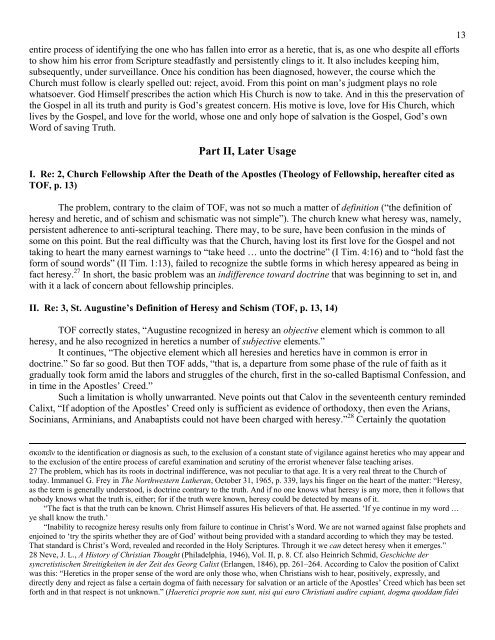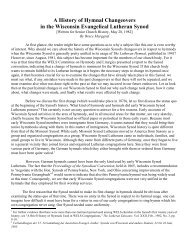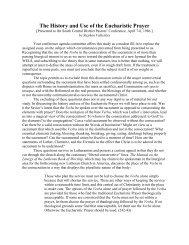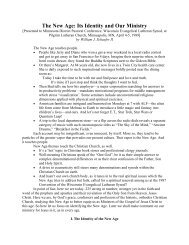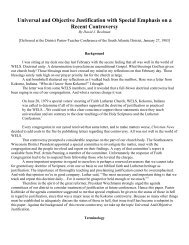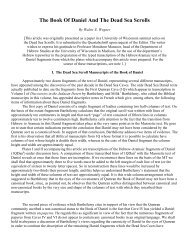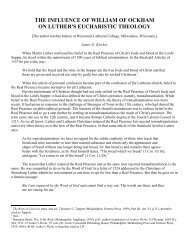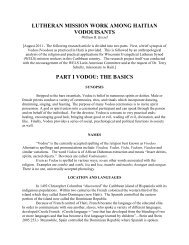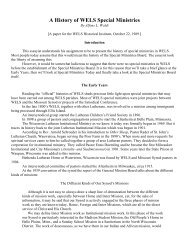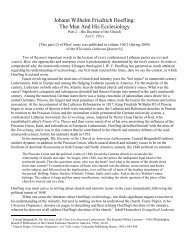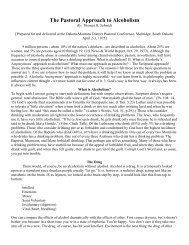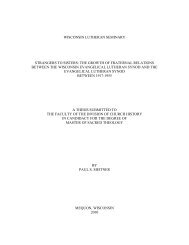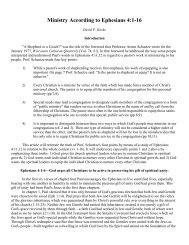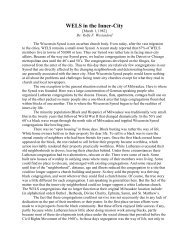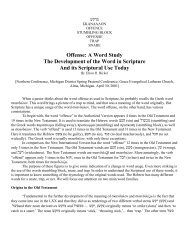What Is Heresy? - Wisconsin Lutheran Seminary Library: Essays
What Is Heresy? - Wisconsin Lutheran Seminary Library: Essays
What Is Heresy? - Wisconsin Lutheran Seminary Library: Essays
Create successful ePaper yourself
Turn your PDF publications into a flip-book with our unique Google optimized e-Paper software.
13<br />
entire process of identifying the one who has fallen into error as a heretic, that is, as one who despite all efforts<br />
to show him his error from Scripture steadfastly and persistently clings to it. It also includes keeping him,<br />
subsequently, under surveillance. Once his condition has been diagnosed, however, the course which the<br />
Church must follow is clearly spelled out: reject, avoid. From this point on man’s judgment plays no role<br />
whatsoever. God Himself prescribes the action which His Church is now to take. And in this the preservation of<br />
the Gospel in all its truth and purity is God’s greatest concern. His motive is love, love for His Church, which<br />
lives by the Gospel, and love for the world, whose one and only hope of salvation is the Gospel, God’s own<br />
Word of saving Truth.<br />
Part II, Later Usage<br />
I. Re: 2, Church Fellowship After the Death of the Apostles (Theology of Fellowship, hereafter cited as<br />
TOF, p. 13)<br />
The problem, contrary to the claim of TOF, was not so much a matter of definition (“the definition of<br />
heresy and heretic, and of schism and schismatic was not simple”). The church knew what heresy was, namely,<br />
persistent adherence to anti-scriptural teaching. There may, to be sure, have been confusion in the minds of<br />
some on this point. But the real difficulty was that the Church, having lost its first love for the Gospel and not<br />
taking to heart the many earnest warnings to “take heed … unto the doctrine” (I Tim. 4:16) and to “hold fast the<br />
form of sound words” (II Tim. 1:13), failed to recognize the subtle forms in which heresy appeared as being in<br />
fact heresy. 27 In short, the basic problem was an indifference toward doctrine that was beginning to set in, and<br />
with it a lack of concern about fellowship principles.<br />
II. Re: 3, St. Augustine’s Definition of <strong>Heresy</strong> and Schism (TOF, p. 13, 14)<br />
TOF correctly states, “Augustine recognized in heresy an objective element which is common to all<br />
heresy, and he also recognized in heretics a number of subjective elements.”<br />
It continues, “The objective element which all heresies and heretics have in common is error in<br />
doctrine.” So far so good. But then TOF adds, “that is, a departure from some phase of the rule of faith as it<br />
gradually took form amid the labors and struggles of the church, first in the so-called Baptismal Confession, and<br />
in time in the Apostles’ Creed.”<br />
Such a limitation is wholly unwarranted. Neve points out that Calov in the seventeenth century reminded<br />
Calixt, “If adoption of the Apostles’ Creed only is sufficient as evidence of orthodoxy, then even the Arians,<br />
Socinians, Arminians, and Anabaptists could not have been charged with heresy.” 28 Certainly the quotation<br />
σκοπεῖν to the identification or diagnosis as such, to the exclusion of a constant state of vigilance against heretics who may appear and<br />
to the exclusion of the entire process of careful examination and scrutiny of the errorist whenever false teaching arises.<br />
27 The problem, which has its roots in doctrinal indifference, was not peculiar to that age. It is a very real threat to the Church of<br />
today. Immanuel G. Frey in The Northwestern <strong>Lutheran</strong>, October 31, 1965, p. 339, lays his finger on the heart of the matter: “<strong>Heresy</strong>,<br />
as the term is generally understood, is doctrine contrary to the truth. And if no one knows what heresy is any more, then it follows that<br />
nobody knows what the truth is, either; for if the truth were known, heresy could be detected by means of it.<br />
“The fact is that the truth can be known. Christ Himself assures His believers of that. He asserted. ‘If ye continue in my word …<br />
ye shall know the truth.’<br />
“Inability to recognize heresy results only from failure to continue in Christ’s Word. We are not warned against false prophets and<br />
enjoined to ‘try the spirits whether they are of God’ without being provided with a standard according to which they may be tested.<br />
That standard is Christ’s Word, revealed and recorded in the Holy Scriptures. Through it we can detect heresy when it emerges.”<br />
28 Neve, J. L., A History of Christian Thought (Philadelphia, 1946), Vol. II, p. 8. Cf. also Heinrich Schmid, Geschichte der<br />
syncretistischen Streitigkeiten in der Zeit des Georg Calixt (Erlangen, 1846), pp. 261–264. According to Calov the position of Calixt<br />
was this: “Heretics in the proper sense of the word are only those who, when Christians wish to hear, positively, expressly, and<br />
directly deny and reject as false a certain dogma of faith necessary for salvation or an article of the Apostles’ Creed which has been set<br />
forth and in that respect is not unknown.” (Haeretici proprie non sunt, nisi qui euro Christiani audire cupiant, dogma quoddam fidei


